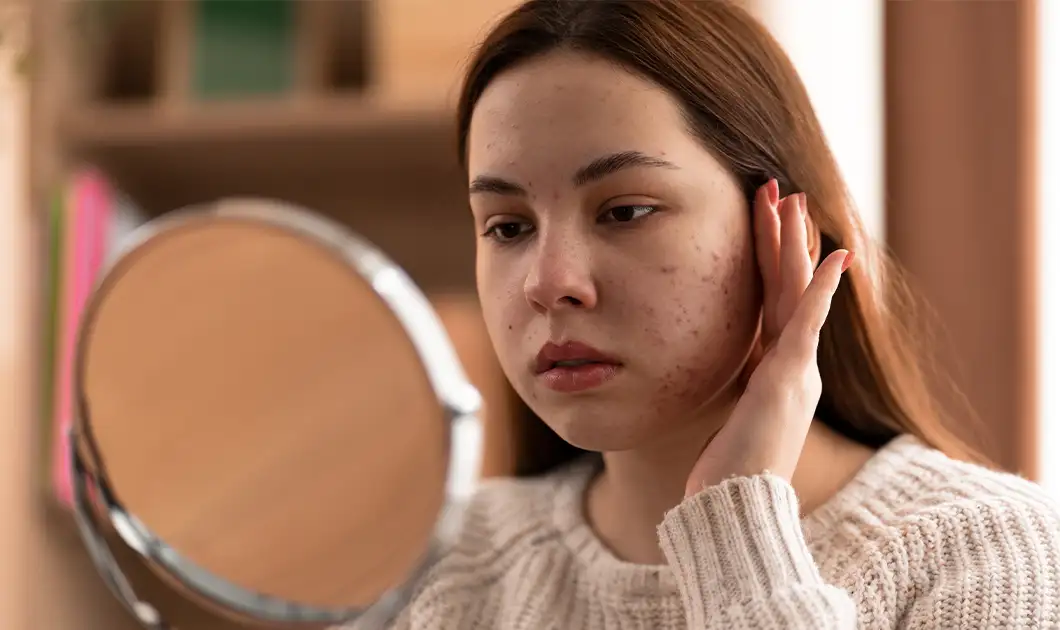CONTACT US
- +91 9632629459
- 942, 1st Floor, above ICICI Bank, near BDA Complex, 21st main , BSK 2nd Stage, Bengaluru- 560070
- skinsciencebengaluru@gmail.com

Get The Skin of Your Dreams With Pigmentation Removal Treatments At Skin Science!
Have dark spots or patches on the skin? And thinking about what has caused it or how to get rid of it. You are on the right page. Although dark spots and patches are difficult to eliminate, with the help of certain steps and a dermatologist in Bangalore, Dr. Vani Vasanth, at Skin Science, one can reduce hyperpigmentation and achieve clear and radiant skin with their state-of-the-art treatments.
What is Hyperpigmentation?
Hyperpigmentation is a kind of skin discolouration wherein the skin presents dark spots or patches. It is a fairly common aesthetic skin issue that can affect people of any skin type. Skin darkening can happen in small or large areas of the skin, and rarely affects the entire body.
Types and Symptoms of Hyperpigmentation
Hyperpigmentation is classified into several different kinds. The most common ones are:
- Age spots, liver spots, or solar lentigines- These are brown, tan, or black-coloured flat, small spots on the skin that typically develop on the skin of 40-year-old individuals. Mostly, they are noticed on the sun-exposed parts of the body such as the face, the back of the hands, forearms, or shoulder, usually of an individual who has a family history of age spots, those who had prolonged exposure of their skin to sun, or older adults.
- Melasma- This type of hyperpigmentation is described as blotchy or patchy discolouration of the skin, usually of the face and, in some cases, on the neck, arms, or other body sites. Usually, it affects women who are pregnant or taking oral contraceptives and those with medium to darker skin tones. When pregnant women have hyperpigmentation, the condition is called chloasma or “the mask of pregnancy.” For more details on melasma treatment in Bangalore, contact skin experts at Skin Science.
- Post-inflammatory hyperpigmentation- This kind of hyperpigmentation refers to the spots or patches of darkened skin that develop after the skin of any body part is injured or traumatised. The discoloured skin spots or patches appear after an inflammatory skin condition. The triggers include acne breakout, skin irritation/injury, hormonal changes, intake of certain medications, or another skin condition like eczema. This type of skin discoloration is more likely seen in people with medium to dark skin tones.
- Tanning- Tanning is a form of hyperpigmentation, characterised by the darkening of the skin of the sun or UV radiation-exposed areas of the body.
- Freckles- Freckles are small, flat spots of red, tan, light, or dark brown color that appear usually on sun-exposed areas of the body.
- Underarm pigmentation- Underarm pigmentation or dark underarms are usually the result of post-inflammatory hyperpigmentation (PIH). It is triggered when the skin is irritated, inflamed, or damaged.
- Lichen planus pigmentosus (LPP)- It is a skin condition characterised by ill-defined, black or brown macules on the sun-exposed areas.
- Lip melanosis– Lip melanosis is an aesthetically disfiguring condition, a pigmentation of the lips where the lips appear darker than usual.
Skin Science is one of the best pigmentation treatment clinics in Bangalore. At the clinic, the best dermatologists, laser experts, and skin aestheticians provide the most advanced and promising treatments for pigmentation removal. Schedule a visit to eliminate skin tags, age spots, melasma, and any type of skin-darkening issues effectively.
Causes of Hyperpigmentation
Hyperpigmentation results from an excess melanin deposits in certain areas of the skin. Melanin is a coloured pigment that gives the skin its natural colour and is produced by specialised cells called melanocytes.
The excess melanin production and the resulting skin darkening can occur because of several factors, including:
- Sun exposure- The areas of the skin that are exposed to the sun’s UV rays can drive the overproduction of melanin, resulting in dark spots.
- Hormonal changes- A fluctuation in female se-x hormones (oestr-ogen and prog-esterone) during pregnancy, menopause, and intake of hormone-based drugs like birth control pills can trigger increased skin pigmentation- a hormonal-induced hyperpigmentation condition, known as melasma.
- Skin trauma or inflammation- Inflammatory acne breakout, wound, cut, bug bite, friction or a skin condition like eczema can all prompt skin inflammation and subsequently start the overproduction of melanocytes. This results in darkened skin upon healing of the inflamed site.
- Certain drugs- Hyperpigmentation of the skin can be an outcome of using some medications. These include antibiotics, antimalarial drugs, anti-seizure medications, non-steroidal anti-inflammatory drugs, hormonal birth control pills and drugs known to increase skin’s sensitivity to light, such as reti-noids and some medications for treating hypertension.
To rule out the exact cause that is causing skin darkening and pigmentation, get in touch with Dr. Vani Vasanth, the best doctor for hyperpigmentation skin treatment in Bangalore.
Best In-Office Treatment Options for Hyperpigmentation
- Chemical/ melasma peel- This therapy involves applying a layer of safe acid solution concentration on the dark spots/patches. The acid helps remove the highly pigmented skin layers, thereby lightening the darkened skin. Depending upon the severity of hyperpigmentation, the chemical peel that is chosen ranges from light to deep. Melasma is the most difficult-to-treat kind of hyperpigmentation that can be best treated with chemical peels such as glycolic acid, salicylic acid, treti-noin, or trichloro-acetic acid.
- Laser resurfacing- There are two kinds of lasers, ablative and non-ablative lasers, that can resurface the skin. Ablative lasers such as carbon dioxide, erbium, and advanced combination laser systems work to peel off the outermost skin layers to help fade the dark spots/patches. The heat from the laser gets absorbed by melanin in the targeted skin, which destroys the extra pigment and even heats the dermis to induce fresh collagen synthesis.
Non-ablative laser heat beneath the skin surface further encourages collagen development without harming the skin surface. To get the laser pigmentation treatment in Bangalore, make a visit to the best dermatology clinic, Skin Science. - IPL photo facial- Intense pulsed light therapy uses light energy to thermally destroy excess melanin. The heat from light helps stimulate collagen production, improving overall skin tone and texture, thereby minimising the appearance of dark spots/patches.
- Microneedling combined with P-R-P therapy- In this skin-darkening treatment in Bangalore, a special roller or device with multiple microneedles is used first to prick the hyperpigmented skin. The needle pricking causes micro-injuries in the skin, and the body naturally heals these injuries by inducing collagen production. To enhance the effects of microneedling, platelet-rich plasma injection is administered into the skin or topically applied over the microchannels created by microneedling. The P-R-P contains natural growth factors and essential proteins that help heal the skin. The discoloured skin appearance gets reduced as the skin heals and the skin tone gets even overall.
- Medi-facial- This therapy involves skin exfoliation, hydration, and the use of dedicated medical-grade treatment products tailored to cater to the needs and goals of an individual to address various skin concerns and imperfections and improve overall skin health.
Prevention of Hyperpigmentation
All kinds of hyperpigmentation are not preventable or can be stopped from becoming prominent. However, there are some ways to reduce the risk of hyperpigmentation. Here are they:
- Sun-protect the skin by wearing sun-protective clothing or using sunscreen with adequate SPF.
- Avoid the application of skin-lightening products to lighten the overall skin complexion. Seek advice from a dermatologist before using any skin-lightening cosmetics.
- Choose the skin care product carefully, as ingredients like phytic and kojic acids can help disrupt tyr-osine- the first component in melanin production. Try incorporating Vitamin C or other antioxidants into your beauty routine.
- Avoid touching the skin often and scratching or picking at the skin after an injury or when the skin has acne, spots, or scabs.
For more details, get in touch with a dermatologist in Bangalore at Skin Science to rule out the root cause causing skin darkening and determine which treatment will work effectively to remove pigmentation and help one achieve a youthful, radiant, and brightened skin they always desired!
Frequently Asked Questions
The fading of the dark spots/patches depends upon its cause. Hyperpigmentation mostly disappears on its own, but the fading takes time and relies on genetics and the skin makeup of an individual. If the spots or patches on the skin are a few shades darker than the surrounding natural skin colour, fading can occur within a year, and if the melanin pigments are deep-seated, the fading can take several years. Severe hyperpigmentation may never cease to be noticed and would require appropriate treatment.
Areas of the skin with mild hyperpigmentation can lighten with at-home, natural remedies. Researchers suggest aloe vera, green tea extracts, soy, rice water, and liquorice extracts fade out hyperpigmented skin.
Hyperpigmentation issues may run in families. It can also be triggered by a rare condition due to an underlying medical condition like Addison’s disease. People who have acne breakouts, psoriasis, or eczema are also at high risk of developing dark spots. Other risk factors of hyperpigmentation include pregnancy or use of oral contraceptives, use of drugs that increase photosensitivity of the skin, trauma to the skin, dark-skin type, and intake of certain drugs such as antimalarial drugs, antipsychotic drugs, tetracyclines, cytotoxic drugs, phenytoin, and NSA-ID’s.
Eating unhealthy does have a relation with hyperpigmentation, though indirectly. However, certain foods such as Chickpeas, flax seeds, black beans, and soy products containing chemical hormones like estrogens can worsen hormone-induced hyperpigmentation.
Drinking plenty of water can keep the skin well-hydrated and healthy. However, hyperpigmentation cannot be treated by just increasing the water consumption.
Hyperpigmentation can be eliminated faster with effective techniques such as laser therapy, chemical peel, microdermabrasion, and other cosmetic procedures suggested by a dermatologist.
The best skin specialists for hyper pigmentation treatment in Bangalore at Skin Science can help identify the type and cause of hyperpigmentation by examining the skin using a Wood’s light lamp, reviewing the medical history of the patient, and asking the patient about lifestyle events or habits. Sometimes, a skin biopsy may be recommended to confirm diagnosis.
Why wait any longer? Visit Skin Science now to achieve pigmentation-free, brighter, and glowing skin, and get more details on pigmentation treatment cost in Bangalore.

